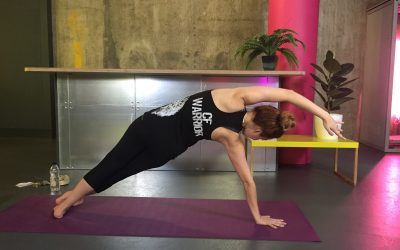Today, I introduce a new project. Ever since the idea struck me it’s been stewing and growing — and like many of the best things in life I find it simultaneously terrifying and invigorating, which probably means I should just go for it. So here it is…
The One Take Project: Because real life doesn’t have do-overs
Action: To publicly post “single take” recordings of myself singing music that I have performed, expect to perform, or would like to perform someday.
Objective: To get over myself.
Background:
Performance anxiety (particularly in auditions) used to be vocally crippling for me, as the numerous voice coaches who’ve seen me break down in tears in studio can attest. It has been a long, hard road getting over it. I’m still a work in progress, but I think I’ve come a long way, even just in the past year or so.
For me, the turnaround started with the realization that art is not perfect. Nobody is expecting perfection from me, and I should not expect it of myself. In school, I was a chronic overachiever, always pushing myself to be perfect. I was never satisfied unless I got an A, and even if I got a 95%, I’d dwell on that last 5% that I missed out on instead of being happy with how I did. Even now I still carry a grudge for the gym teacher in 9th grade who was supposed to grade me pass/fail but gave me a B+ and knocked my cumulative GPA from a 4.0 to a 3.85. But I digress…
Post-graduation, it took me a while to figure out that there were no assignments or concrete “do this=achieve that” in real life. Left to my own devices, I felt I had no barometer to measure my improvement. I have to strive for something, or I get depressed and down on myself. I’m always setting new goals for myself, even ones that are flat out ridiculous. I’ve even given myself lung-function goals like it was all within my control (hint: it’s not).
In a culture where recorded media is pre-and-post-produced, and magazine photos are airbrushed beyond all recognition, it’s easy to lose perspective of one’s own ability, achievements, and beauty. This is one reason I love opera – it’s one of the last bastions of music where we can hear singers perform in all their real, flawed loveliness. What makes opera performed by great singers so powerful is that their flawed humanity actually contributes to, instead of detracts from, the artistic product. It’s easy to lose sight of this when the music industry and even singing-based “reality” TV shows rely so strongly on editing — or amplifying or otherwise manipulating the human voice — that listeners find authentic performances disconcerting.
Authentic performances like those on an operatic stage have flaws that some listeners, who’ve only heard the music before on a recording, think detracts from their musical experience. This saddens me. Don’t get me wrong, I do not think that all post-production is wrong (or that people shouldn’t wear makeup or that all photoshopped magazine covers should be banned). Such manipulations obviously serve a purpose by making their products more appealing to more people, and who doesn’t like a little unsullied beauty in their lives? But when the pendulum swings too far, from “authentically beautiful” to “manufactured fantasy,” people forget what it is to be real, and what they should expect of themselves and each other.
In art/design/knitting/cooking/whatever, I find that I do a better job when I know I’m working with a limited resource (“I can’t afford more materials – better do it right the first time”). I think about how cameras were used when we only had 24 exposures of film at our disposal – weren’t we more careful about how we used up those precious shots? Now with digital cameras we can take shot after shot, a virtually unlimited number as flash memory is so readily available. But did the quality of our images on the whole get better? No. We know we have more opportunities to get it right, so we aren’t as intentional about the photos we do take. Sometimes we even find that we didn’t capture the image like we’d hoped, because we thought, “OK, I’ve taken a lot now, one of those will be good enough.”
Similarly, I think that the same phenomenon is present in music. When you can always record take after take, are you really giving it your best, entire focus? Or are you just hoping to get enough bits and pieces that you like that you can cobble it together to make a seamless whole? As a person who’s very comfortable with my 4GB SD card, and recording sessions where you can click-in and delete that awful bridge, my goal in this is to accept the fact that when you’re dealing with a live performance, there is only one shot. Things will not be perfect, and that’s OK.
Guiding Principles:
- Acceptance. Of where I am, today. Practice ahimsa – a yoga term meaning kindness – particularly remembering kindness toward myself.
- Acknowledgement without judgment. Of what is beautiful and what is not. Not everything needs to be beautiful. Moments of extreme ugliness are unavoidable and even necessary.
- Perfectionism is the enemy of artistry. Acceptance of imperfection is the first step, but don’t stop there. Embrace it. Incorporate it. Make the art depend on it.
- Allow the body to learn on its own terms. Don’t let the conscious brain overrule the body. Trust the body that it knows how to learn, and is practiced enough to know what it’s doing when it comes time to perform. (Hat tip to The Inner Game of Tennis.)
- Set an intention. Choose ONE thing to think about, or focus on. The brain can overwhelm the body by overthinking or trying to do too many things at once. Choose only one thing to emphasize – what do I want to achieve in this today? What do I want to say? Think about that one thing, and trust the body to do the rest.
- Sing with an orchestra. Always. Even when there isn’t one. I’m learning to combat performance anxiety by rethinking my context. In the past I tried thinking “I’m singing in my living room” while auditioning to make it less intimidating, with awful results. The “picture the audience in their underwear” tactic is a no-go for me. I’m working on switching to “I’m performing with an orchestra and conductor” while I’m singing in my living room, and so far I like the results I’m getting.
- “It’s only music.” This is one of my all-time favorite quotes, courtesy of Barry Johnson (opera singer, voice coach, all-around-nice-guy). He said this to me while I was in the midst of one of my aforementioned pre-audition crying spells. I doubt he thought it would stick with me as much as it did. Sometimes I get so engrossed in what I’m doing – it feels so important to me – that I forget that when it comes right down to it, music is not a life-or-death issue. BAD MUSIC WILL NOT KILL ME, OR ANYONE ELSE (though it may feel like it at times). However, GOOD music can make people very, very glad to be alive.
- Haters gonna hate. Different people like different things. Don’t try to be anything other than what you are, even if you feel like you’re not fitting in or matching someone’s expectation of what you are. As Bernedette Peters said, “You’ve gotta be original, because if you’re like someone else, what do they need you for?” Someone will think you’re a moron, or an untalented hack. THAT’S OK. They’re allowed to have an opinion, as am I. It’s OK if somebody thinks I have nothing to share with the world and should go crawl back under the rock I came from and hide in my little corner of the internet. It’s ALSO OK if my opinion of someone is that they’re an a-hole. (It took me 32 years to realize that.)
Rules:
- Record and post only One Take of a given piece. “One Take” does not mean unpracticed or unrehearsed, or that recording setup/balances are untested. Rather, it is a way to replicate the pressure of a live performance in a virtual environment. In a performance situation rehearsals and sound checks still happen, of course, they just happen before the audience arrives. Or we hit “record,” in this case.
- The use of sheet music is allowed, IF it would be used in an actual performance. So for church or concert music, yes, go for it. But for staged productions (like opera or musical theatre), no. In a theatrical production, if it’s not memorized, it’s not performance ready. Period.
- Be authentic. Share the product, even if you deem it awful.
- Only record pieces that you have/will/want to perform, in real life.
- Posterity/permanence. Never delete that first (and only – see #1) take. That which is permanent is many times more frightening than what is temporary, or only in the present.
- DON’T CHICKEN OUT.
What do I hope to get out of this? Mostly, some solo practice in front of an audience (that’s YOU!) to help me accept that for me, nerves come with the territory. I hope to learn how to coexist with nerves instead of allowing them to adversely impact my performance, or stop me from attempting it altogether. And I’m also hoping that my theory on the imperfection inherent in art will bear out in practice – that for all the flubs or flaws that make me cringe, I’ll capture some moments that will make it all worthwhile.
After all, in real life, there are no do-overs.







This is very insightful and well-written. The reality of live performance vs. “manufactured fantasy” is the primary battle music educators face with ensembles since generally the over engineered recording is 90-100% of what students are exposed to prior to joining a class.
I think this project is a GREAT idea, and with your permission, I’m going to bookmark it and use it as a teaching tool =) Cheers!
Yes, you are welcome to share. With how long it took me to figure this out, I would love it if some of your students could benefit from learning this at an earlier age!
I agree with Tina. I really enjoyed the way you put the tension between ‘live’ and ‘recorded’ into words. Besides you are the MOST talented, astounding and beautiful musician I know, so it would make sense that you would write such a though-provoking post! (wink, wink) I can’t wait to hear your first ‘take one’ recording!
Look who’s talking, Keren! You, with the lilting voice like an angel, with the power to move souls, that could turn the most hardened criminal to redemption! Why, just the other day I was remembering singing with you in the stairwell of Moyer Hall and it nearly brought me to tears. (I’m liking this revisit of the MAC… let’s keep it up!)
Love it… very scary… i’ll have to try it…. go for it Katie! it was fun singing with you at Cyrille’s party.
Indeed – it is always good making music with you!